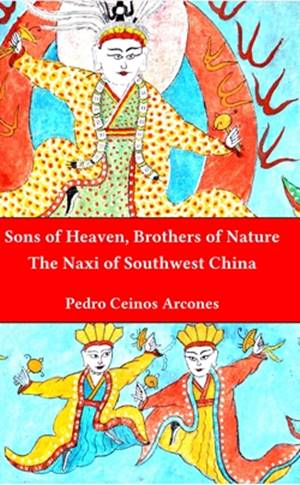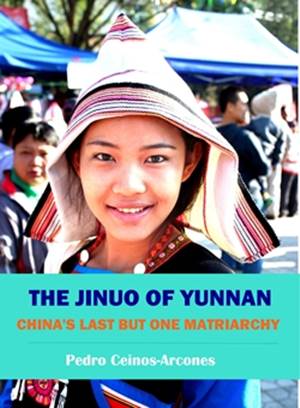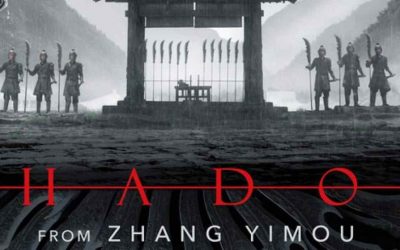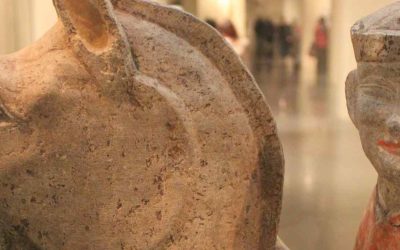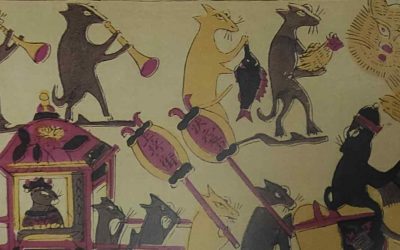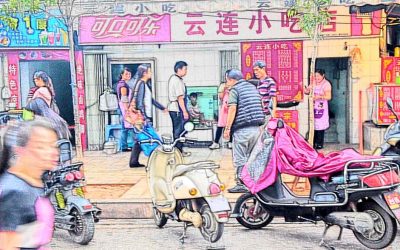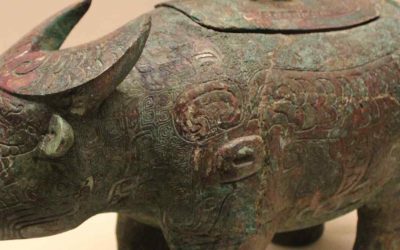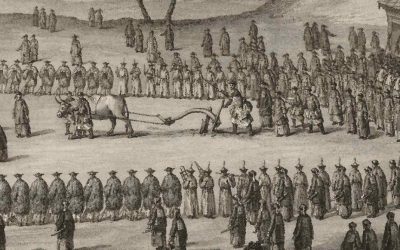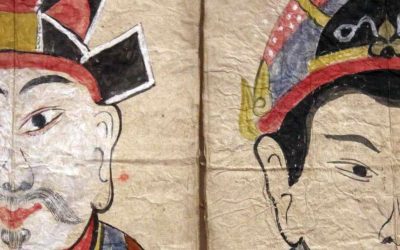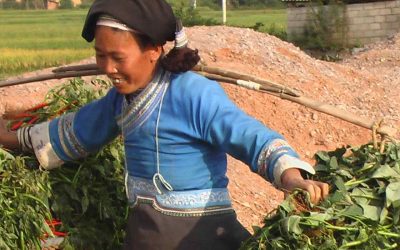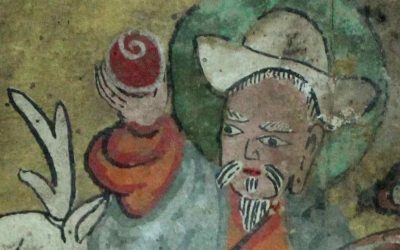In the fourth chapter of India in the Chinese Imagination: Myth, Religion, and Thought (edited by John Kieschnick and Meir Shahar, University of Pennsylvania Press, 2014), Nobuyoshi Yamabe contributes an article (Indian Myth Transformed in a Chinese Apocryphal Text: Two Stories on the Buddha’s Hidden Organ) about a rarely touched matter: The sexual organ of Sakyamuni Buddha.
This chapter is a discussion of two fairly peculiar stories found in the “Sūtra on the ocean-like samādhi of the visualization of the Buddha”, which was allegedly translated to Chinese by Buddhabhadra in the fifth century.
In the standard hagiography of Buddhism, the Buddha’s male organ is said to have been concealed and invisible from the outside. This is not the type of topic that receives major attention in Buddhist scriptures. The Ocean Sūtra has a chapter that is exclusively devoted to this topic, including some strange stories, one of which the author translates:
“A large ring of prostitutes came to Śrāvastī from Mathurā and were doing many evils. Three sons of a rich merchant Rulüda frequented their place and wasted their father’s money. Worrying about this, Rulüda went to King Prasenajit and asked him to execute all the prostitutes. However, the King kept Buddhist vows and did not want to kill people. Therefore, the King went to the Buddha and asked him to admonish the prostitutes.
The Buddha informed Sudatta that he would teach the prostitutes at a debate hall (shichang) in seven days. When the day came, the King beat a golden drum and made all debaters in the country come to the debate hall. All members of the sangha and the prostitutes were also summoned.”
“Then each of the great disciples of the Buddha created his own vehicle, such as a cave, nāgas, and a jewel tree, and, performing miracles in concentration, flew to the debate hall. Finally, the Blessed One led Ānanda and, walking in space, came to the debate hall. The Buddha took a seat and briefly taught about suffering, emptiness, impermanence, and the perfections (pāramitā) to the assembly, but the women did not accept [his teaching].
Among the group of women, a prostitute, Lovable by name, said to the women: “The ascetic Gautama has no desire by nature, and people say that he is impotent. That is why he denounces desire in public. If his bodily parts are complete, he should clearly show us that he has this mark like the Jains did. [If he does so], we will become his disciples. If he does not have this mark, he denounces impurity in vain. This person without an organ has no desire by nature; why would he not preach that desire is impure?”
[The prostitute] having thus spoken, the Tathāgata magically created an elephant. A white lotus emerged between the legs of the elephant and touched the ground. Having seen this, the women burst into laughter. They said to one another: “The ascetic is good at conjuration.” The Buddha also magically created an image of a horse king, who extended his retracted organ. It hung like a beryl cylinder and reached his knees. Having seen it, the women said even more that it was conjuration. After that, the Buddha dismissed the entire audience and confronted the prostitutes by himself. The women laughed loudly and said: “Ascetic, do you have the bodily part or not?” The Buddha said: “I have a complete male body. I am a sound man.”
At that time, the Blessed One opened his undergarment (nivāsana). [The women] saw the Buddha’s body, [which was] entirely flat. Then, [his organ] gradually emerged like that of a horse king. When it first appeared, it was like the bodily organ of an eight-year-old boy, and it gradually grew into the shape of that of an adolescent. Seeing this, all the women rejoiced. Then the hidden organ gradually grew [and became] like a cylindrical banner of lotus flowers. In each layer there were ten billion lotuses; each lotus had ten billion jewel colors; each color had ten billion emanation Buddhas; and each emanation Buddha was served by ten billion bodhisattvas and a boundless assembly.
Then the emanation Buddhas unanimously criticized the faults of the bad desires of the women. Upon hearing this, the prostitutes were overcome by shame and submitted to the Buddha’s teaching. Listening to the Buddha’s sermon, they reached spiritual attainments of various degrees.
More posts on Chinese culture
Shadow – A Film by Zhang Yimou
Shadow - A Film by Zhang Yimou Zhang Yimou leads one of the most consistent and brilliant careers in the cinematography of China, and with The Shadow (Ying) he delights the viewer again with a beautiful and surprising story, based on a very original script, and that...
The horse in the Chinese horoscope
The horse in the Chinese horoscope The horse is one of the animals of later incorporation into Chinese culture. If, as some scholars say, the system of 12 animals in the Chinese horoscope originated in the peoples who lived in the north, in the steppes and deserts...
The rat in the Chinese horoscope
The rat in the Chinese horoscope The rat for the Chinese is an animal to which are associated some positive and some negative qualities, in fact it is considered capable of carrying out numerous enterprises, not in vain it was the first animal to be assigned a sign of...
An oriental interpretation of dreams
An oriental interpretation of dreams Last week, in a book about the Hani minority in the remote Jinping region, one of the authors devoted part of his article on divination to dream interpretation among the Hani. I translated it, added some comments and published it...
What does it mean to dream of a cow in China? We tell you here
What does it mean to dream of a cow in China? We tell you here In the last few days I have stumbled upon several documents dealing with dreams in China, and some with certain fragments explaining, in particular, the meaning of dreaming about a cow. One of the most...
The ox and the ritual plow in springtime
The ox and the ritual plow in springtime Throughout the imperial era, every year the beginning of agricultural work was celebrated by a solemn ceremony called the Plowing Festival. "The emperor himself would take a yellow plow attached to a yellow ox (yellow was the...
More posts on China ethnic groups
The Landing Yao Ancestral Festival of July
The Landing Yao Ancestral Festival of July All around China, the seventh month of the lunar calendar is known as the month of the ghosts, because in this month is celebrated the Mid-Year Festival. The Mid-Year Festival has nowadays many variations and it includes a...
We are lucky- A list of free books about the Zhuang
Free books about the Zhuang Fortunately for the lovers of the Zhuang nationality culture and language, there are some books, freely available to all the interested readers. Here, there is a list of the books we know are in this moment free to read and/or download....
The world of Naxi nationality Dongba deities
The Naxi people believe that every object, animal, plant, or natural phenomena has its own spirit. In the Dongba scriptures more than 2,400 spirits can be found. The sky, earth, sun, moon, mountains, water, wind, and even stones are all believed to be animate and...
The Bulang, aborigines of Yunnan
The Bulang are one of the oldest populations in the Southwest of Yunnan Province. They are considered one of the aboriginal inhabitants of this province, where they could have lived for more than two thousand years. They inhabit this mountainous region that forms the...
To marry a goddess in Yunnan (Jinuo nationality)
Pedro Ceinos-Arcones. China's last but one matriarchy: The Jino of Yunnan. 2018 Jinuos’ main religious specialists are bailabao, mopei and zhalai or Blacksmith. The oldest man of the main clan in the village is called zhuoba or mother of the village; the oldest of the...
Childbirth in Naxi culture
The rituals performed at birth suggest that in the Naxi traditional thought the entering of the Sv life god in a person is a gradual process developed during the last term of pregnancy and the first days of life, and that this process is considered complete in a first...


